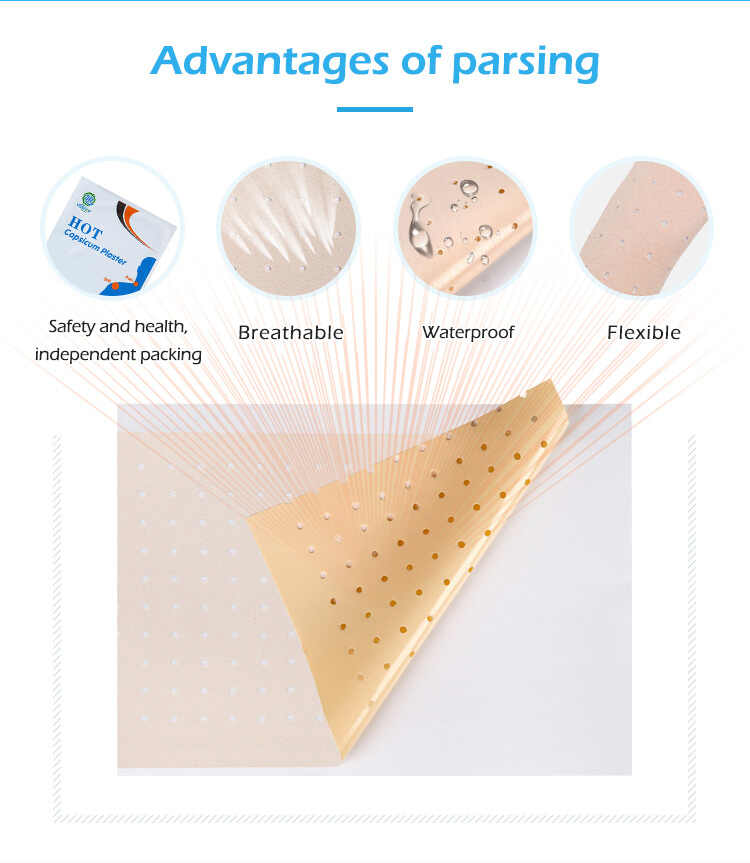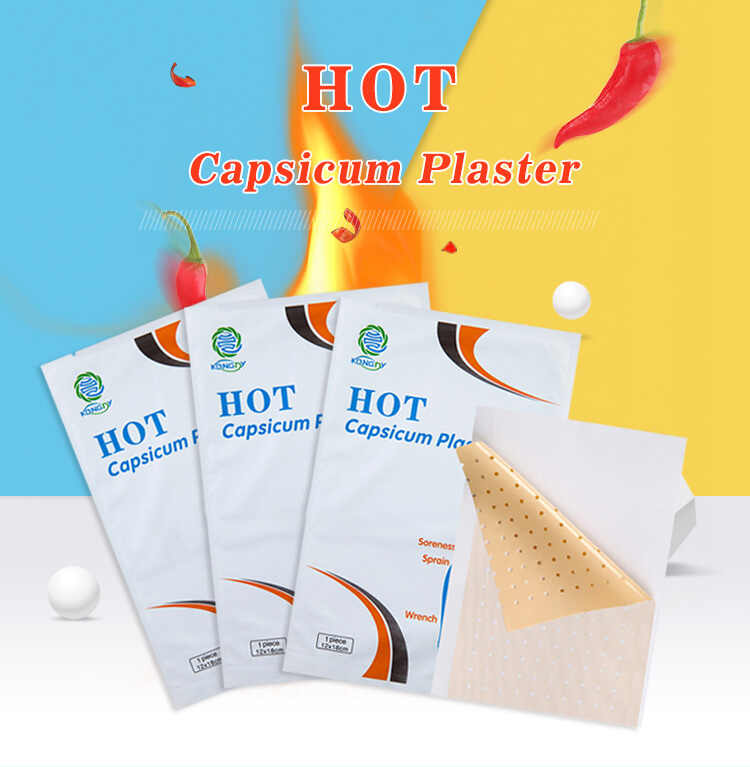What Certifications Should My Herbal Capsicum Plaster Supplier Have?
In the expanding global market for natural pain relief solutions, the Herbal Capsicum Plaster stands out as one of the most trusted products for targeted, herbal-based pain management. Whether you are a startup or an established brand, choosing the right Herbal Capsicum Plaster Supplier is crucial for ensuring your products are safe, effective, and compliant with all regulatory standards.
So, what certifications should your Herbal Capsicum Plaster Manufacturer hold to guarantee product quality and help your brand succeed? This comprehensive guide explains the must-have certifications, why they matter, and how they can impact your success in developing Custom Herbal Capsicum Plasters or launching your own Private Label Herbal Capsicum Plaster line.

Why Certifications Matter When Choosing a Herbal Capsicum Plaster Manufacturer
Today’s consumers expect more than just results — they expect transparency, safety, and trust. Certifications demonstrate that your chosen Herbal Capsicum Plaster OEM adheres to strict standards in manufacturing, safety, sustainability, and ethics.
Partnering with a certified Herbal Capsicum Plaster Supplier gives you peace of mind and strengthens your brand’s reputation in a competitive market. Without the right certifications, you risk delays, regulatory issues, poor product quality, or even damage to your brand’s credibility.
1. Good Manufacturing Practice (GMP) Certification
The first and most critical certification your Herbal Capsicum Plaster Manufacturer should have is Good Manufacturing Practice (GMP) certification.
Why it matters:
GMP ensures that products are consistently produced and controlled according to quality standards. It covers every aspect of production — from raw material sourcing and equipment maintenance to staff training and hygiene.
A GMP-certified Herbal Capsicum Plaster Supplier demonstrates its commitment to product quality and minimizes the risk of contamination, mislabeling, or defects. For any Private Label Herbal Capsicum Plaster, this is a non-negotiable foundation for building trust with retailers and customers.
2. ISO Certifications (Especially ISO 9001 and ISO 13485)
ISO 9001: This is one of the world’s most recognized quality management system standards. A Herbal Capsicum Plaster OEM with ISO 9001 certification demonstrates its dedication to continual improvement, consistent quality, and customer satisfaction.
ISO 13485: This certification is specifically for medical device manufacturers. Since Herbal Capsicum Plasters are often regulated as medical devices in certain countries, an ISO 13485-certified Herbal Capsicum Plaster Manufacturer shows compliance with strict medical device requirements, covering design, production, and distribution.
Why it matters:
These ISO certifications ensure that your Custom Herbal Capsicum Plaster is manufactured with precision and consistent quality, helping you comply with international standards.
3. CE Marking (For European Market)
If you plan to distribute your Private Label Herbal Capsicum Plaster in Europe, you need a supplier that can help you secure CE marking.
Why it matters:
The CE mark means that the product meets European health, safety, and environmental protection requirements. It’s mandatory for many medical products, including transdermal plasters and patches.
A Herbal Capsicum Plaster Supplier with CE compliance experience can assist with technical documentation, clinical evaluation (if required), and ensure your product is ready for the EU market.
4. FDA Registration (For the US Market)
If your brand wants to enter the lucrative US market, choose a Herbal Capsicum Plaster OEM that is FDA-registered and experienced with US regulations.
Why it matters:
While the FDA does not issue “certifications” for Herbal Capsicum Plasters per se, registration shows that the manufacturer follows US GMP regulations under 21 CFR Part 820 for medical devices.
Your Herbal Capsicum Plaster Manufacturer should also help with product listing, labeling compliance, and any necessary over-the-counter (OTC) drug monograph adherence if the patch includes active ingredients regulated by the FDA.
5. ISO 22716 (Good Manufacturing Practice for Cosmetics)
Some Custom Herbal Capsicum Plasters are positioned as wellness or cosmetic products rather than medical devices. In that case, ISO 22716 certification is important.
Why it matters:
This standard provides guidelines for the production, control, storage, and shipment of cosmetic products, ensuring safety and consistent quality.
Choosing a Herbal Capsicum Plaster Supplier with ISO 22716 certification can help you expand your product positioning, especially if you plan to market your plasters as lifestyle wellness items.
6. Environmental and Sustainability Certifications
Modern consumers want products that align with their values, including environmental responsibility. Consider a Herbal Capsicum Plaster Manufacturer with:
ISO 14001: Certification for environmental management systems.
Eco-friendly certifications: Such as organic ingredient sourcing or biodegradable packaging compliance.
Why it matters:
If your Private Label Herbal Capsicum Plaster uses sustainably sourced herbs or eco-friendly packaging, these certifications strengthen your brand’s appeal to eco-conscious buyers.
7. Halal and/or Kosher Certifications
Depending on your target market, you may want a Herbal Capsicum Plaster OEM that offers Halal or Kosher certification.
Why it matters:
These certifications ensure that the ingredients and production processes comply with specific dietary or religious requirements, opening your product to broader markets.
8. Other Regional or Country-Specific Certifications
In some countries, Herbal Capsicum Plasters may be regulated by national health authorities. For example:
CFDA (China Food and Drug Administration) approval for products sold in China.
KFDA (Korea Food and Drug Administration) for products in South Korea.
TGA (Therapeutic Goods Administration) compliance for Australia.
An experienced Herbal Capsicum Plaster Manufacturer can help you navigate these local requirements and secure the right certifications.
Verifying Your Herbal Capsicum Plaster Supplier’s Certifications
Having certifications on paper is one thing — verifying them is another. Here’s how to make sure your Herbal Capsicum Plaster Supplier truly holds these credentials:
✅ Request current certificates: Always ask for updated, valid copies.
✅ Check issuing bodies: Ensure certifications come from recognized, reputable organizations.
✅ Visit the facility: If possible, visit the Herbal Capsicum Plaster OEM to see their production environment and quality management systems in action.
✅ Ask for audit records: Reliable manufacturers are transparent and can share inspection or audit reports to demonstrate ongoing compliance.
Certifications Are Not One-Size-Fits-All
Your ideal certifications will depend on your product type, target market, and positioning strategy. A skilled Herbal Capsicum Plaster Supplier will guide you through what’s required for your unique goals — whether you’re creating a Custom Herbal Capsicum Plaster or developing an entire Private Label Herbal Capsicum Plaster range.
Additional Qualities to Look for in a Certified Herbal Capsicum Plaster Manufacturer
Certifications are crucial, but they’re only part of the equation. The best Herbal Capsicum Plaster OEM partners also offer:
R&D capabilities for new formulations.
Flexible production for small or large batches.
Packaging and design support for private label lines.
Clear communication throughout development and production.
When you combine solid certifications with these added services, you have a partner capable of supporting your business as you grow.
Final Thoughts: Certifications Build Trust and Open Markets
In summary, choosing a Herbal Capsicum Plaster Manufacturer with the right certifications protects your brand, builds consumer trust, and ensures your products comply with local and international regulations.
From GMP and ISO to CE, FDA, Halal, or regional approvals, your supplier’s credentials speak volumes about their commitment to quality and your brand’s reputation.
When you select a certified Herbal Capsicum Plaster Supplier, you unlock the full potential of your Private Label Herbal Capsicum Plaster line — delivering products that are safe, effective, and trusted worldwide.
Related Questions & Short Answers
Q1: Why is GMP certification so important for a Herbal Capsicum Plaster Manufacturer?
GMP ensures that the manufacturer consistently produces high-quality, safe products under strict hygiene and process controls.
Q2: Do I need ISO 13485 certification for a Custom Herbal Capsicum Plaster?
If you market your plaster as a medical device, ISO 13485 helps meet regulatory requirements for medical-grade products.
Q3: Can my Herbal Capsicum Plaster OEM help me get CE marking?
Yes. A reputable Herbal Capsicum Plaster Supplier can guide you through the CE marking process for the European market.
Q4: Is FDA registration necessary for Herbal Capsicum Plasters?
For the US market, FDA registration ensures your product meets local medical device regulations and labeling requirements.
Q5: Should I choose a Private Label Herbal Capsicum Plaster Supplier with environmental certifications?
Yes, if sustainability is part of your brand promise, eco-certifications can enhance your appeal to environmentally conscious consumers.






